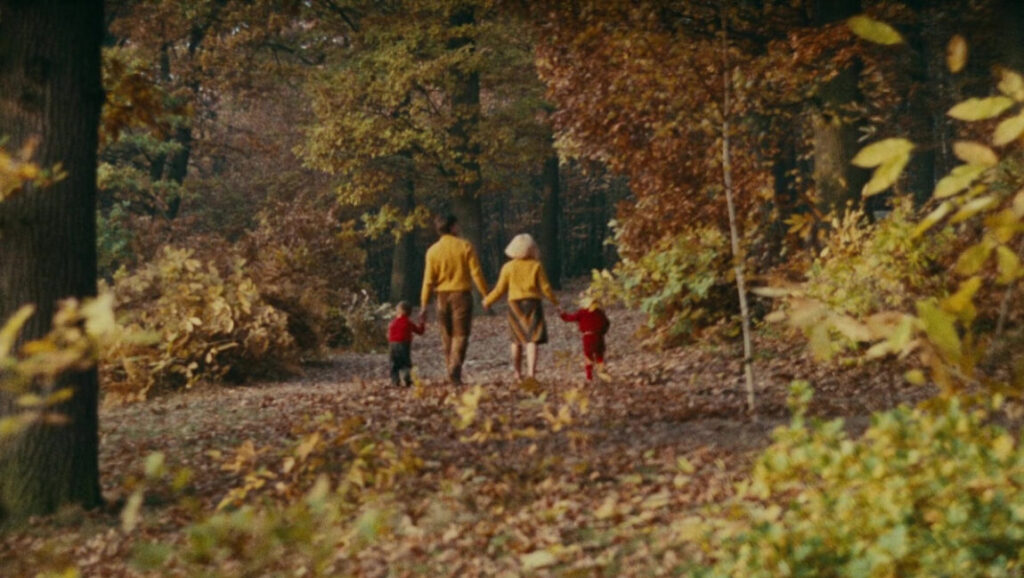The first image of Agnes Varda’s 1965 film Le Bonheur (meaning “happiness” in English) is that of a yellow sunflower beaming in the radiant light of a perfect summer day. As the opening credits appear on-screen, we cut to another similarly-situated sunflower, and then to a third, but this last flower appears somewhat droopier than the others. Cutting back and forth between this languid flower and its perkier counterparts at first reads as playful, but as the speed of the cuts increases, the effect approaches a sort of violence, and in that uncomfortable juxtaposition lies the key to the entire film. Varda’s approach is to tell this should-be disturbing story in a tone of such impeccable cheerfulness that one could easily overlook the sharpness of its critique — in fact one could even overlook that it’s a critique in the first place. In her first feature film in color, Varda seems to share an affinity with the gaudy mise-en-scene favored by her husband Jacques Demy; not unlike his The Umbrellas of Cherbourg from the previous year, every frame is stuffed with bold colors, every outfit meticulously coordinated to match the vibrantly-painted walls and lush beds of flowers that serve as backdrops for the film’s characters. Just as in the credit sequence, the only formal element that casts any overt sense of doubt is Varda’s jarring montage. At one point our male protagonist François (the unflappably rosy Jean-Claude Drouot) is intercut with images of a roaring lion, suggesting a primal, animalistic quality that becomes crucial as we begin to understand his character. Another scene finds François’ wife Thérèse (Claire Drouot — Jean-Claude’s actual wife) asking her husband which he prefers, Brigitte Bardot or Jeanne Moreau, to which he charmingly replies, “Which woman? You”; the film provides its own, somewhat less wholesome, answer to her question, cutting abruptly to an image of a cabinet door at his workplace plastered with sensual pin-up photos of the two actresses. It’s only via cinematic cuts that any cracks in the film’s sumptuous surface become visible.
Varda’s approach is to tell this should-be disturbing story in a tone of such impeccable cheerfulness that one could easily overlook the sharpness of its critique — in fact one could even overlook that it’s a critique in the first place.
The rather simple story seems to bear the markings of a familiar set-up. François and Thérèse live a perfect life: they’re happy and in love, and seem to spend most of their time frolicking in the edenic French countryside with their two beautiful children. They’re a working class family — François is a carpenter and Thérèse a dressmaker — but there is no indication of financial concern. The only threat to their charmed life comes in the form of Émilie (Marie-France Boyer), a blonde Post Office secretary whom François meets while out of town on a job, and quickly falls for. But oddly enough, François’ infidelity does not bring with it any guilt or shame, it only makes him happier. For François, “joy works by addition”; he loves both women, but that doesn’t present a problem as much as it does an opportunity for more love, more happiness. This is not a story of trouble in paradise, rather it’s one of a paradise conspicuously lacking trouble. There is no conflict, only mounting pleasures; the two women are “desserts,” and François sees no reason not to endlessly indulge his natural cravings. But as lecherous as his behavior reads on the page, the film’s sunny disposition never wavers. Speaking on the film’s conception, Varda said that she “imagined a summer peach, with its perfect colors, and inside there is a worm.” But unlike the work of, say, David Lynch, to which that quote could also be applied, the worm is never exposed — never seen, only felt. And once again, it’s the editing that is most evocative: a late, would-be turning point comes with an innocuous walk in the park that turns tragically fatal, but we experience it as an instantaneous vanishing. Thérèse’s death occurs in the elliptical space of a single cut, immediately following François’ untroubled confession. And despite his brief period of (sincere) mourning, her absence is ultimately of little consequence. Soon enough autumn’s warm earth tones supplant the lush foliage of summer, and Émilie slides almost seamlessly into the vacant role left by Thérèse, any momentary interruption of François’ bliss forgotten in the changing of the seasons.
Part of Kicking the Canon – The Film Canon.


Comments are closed.